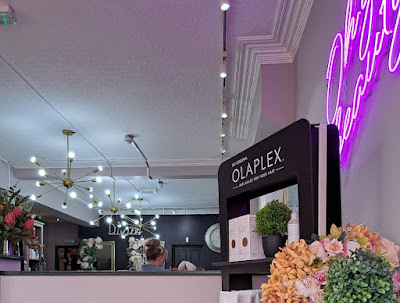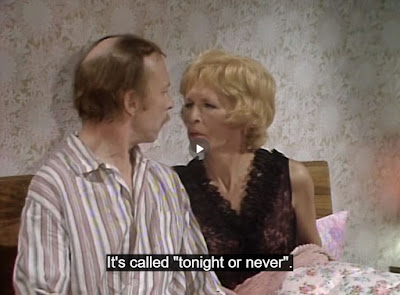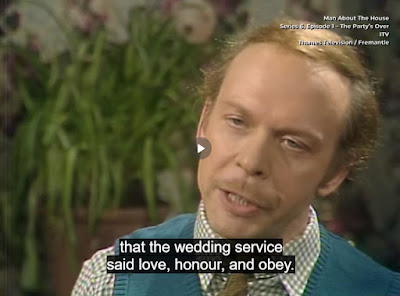09:15 I drive Lois to the Divine hair-salon in Barnard's Green for her 9:30 appointment with her stylist, Rachel.
She settles quickly down in Rachel's booth, while I sit and look at my phone. I'm just a few feet away, on the couch in the adjacent "waiting area", where I can absorb some of the salon's seductive perfumes and "harem" vibe, and also overhear some of Rachel's "chat": she's just come back from a holiday in Greece with her boyfriend, I quickly find out.
I'm not deliberately "earwigging", needless to say, but Rachel's chat about her adventures with her boyfriend is far more interesting than anything I can find on my phone, to put it mildly!
While I'm sitting there on the couch, a Frenchwoman comes in brandishing a phrase book which has obviously been turned to the "Chez la coiffeuse" page or something similar, and she tells the receptionist, in her charming French accent, exactly what she wants doing with her hair.
By coincidence, Tünde, my Hungarian penfriend, sent me an interesting and amusing article a few days ago from the influential Hungarian news website telex.hu, all about the history of the English language.
And the article mentions what must have been one of the world's earliest phrase books for English-speaking travellers to France, the 15th century "Manieres de Langage", and the scope of the book goes far beyond "Chez la coiffeuse" and that kind of thing.
Oh yes!!!!
For instance, if you're travelling in a foreign country, how do you politely say no to somebody who wants you to go to bed with them?
Phrase books today seldom cover that kind of malarkey. And I read recently, on the influential insider.com website, that in Italy or Spain, you don't even need to put your "Just naff off, will you!" into words, and you don't even have to give them a rude gesture.
For example, in Italy, you can just hand the person a playing card - the two of clubs, the least valuable card in the pack - and this tells unwelcome pests exactly what you think of them. Whereas in Spain you might offer them a pumpkin - again thought of as the epitome of the mundane.
As for the overheads of these subtle tactics, well, - keeping a bunch of playing cards on you when travelling in Italy wouldn't be too bad, but, in Spain, how would you make sure you always had a pumpkin within reach?
I think we should be told, don't you, and quickly!
However, people were always less polite and more direct in past centuries, weren't they.
And according to the 15th century "Manieres de Langage", quoted on the Hungarian website, English men travelling in France were advised to fend off unwanted advances by saying (in medieval French) "Madam, don't I know you? Are you sure you haven't got another gentleman friend to see to you?", while English women were advised to go with, "Away with you, to your whore! You were obviously made for each other!"
As the article in telex.hu points out, in those crazy, far-off days of the 15th century, French, although no longer the official 'court language' in England, was very much the most useful language to be able to speak, wherever you travelled abroad because it was the language most widely known, much as English is today. And this is why we still call this type of go-to language a "lingua franca", a reference to the historical supremacy of French in the international sphere.
And because French was the "lingua franca" in medieval times, French people had the perfect excuse not to study other languages at all, much the same situation as it is today for native English speakers. And certainly, if you go by the standards of the French guards in "Monty Python and the Holy Grail", the guards' grasp of idiomatic English was poor by anybody's standards, to put it mildly.
The French guards' standard put-down and insult to their English enemies, "Your mother was a hamster and your father smelt of elderberries" doesn't really come across well in English, that's for sure. Nor does it sound much better in the standard Hungarian dubbing of the film: "Hörcsög volt az a jó anyád, és az apád fókabajszu ganaijtúró" ("Your mother was a hamster, and your father was a dung curd with a seal's moustache").
But what a crazy world we live in, don't we !!!!









































No comments:
Post a Comment